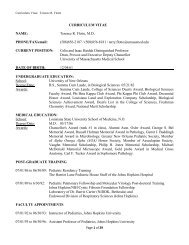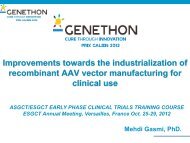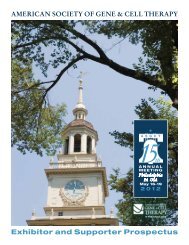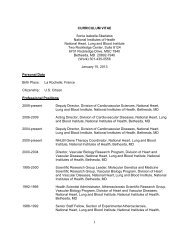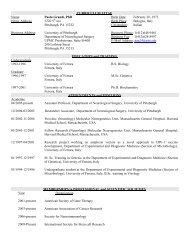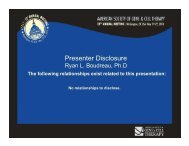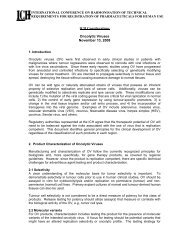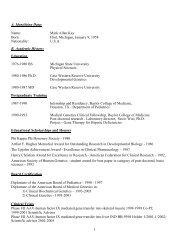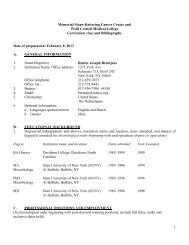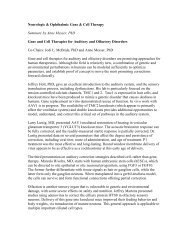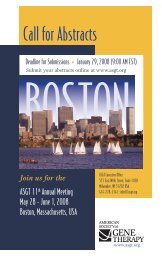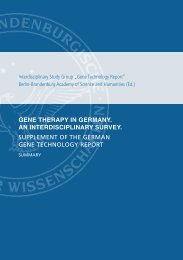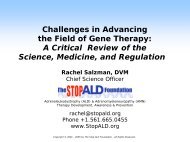13 th AnnUAL MEETing | Washington, DC USA May 19-22, 2010 67Program ScheduleScientific Symposium 4018:30 am - 10:30 amRoom: Virginia SuiteLocal Delivery <strong>of</strong> Chemical <strong>Gene</strong> <strong>Therapy</strong> – Mechanisms, Quantitative Understanding and Applications <strong>of</strong> Biodegradable CarriersChairErnst Wagner, PhDSpeakersLonnie D. Shea, PhDLocalized <strong>Gene</strong> Delivery by Biomaterial ImmobilizationBiomaterials are combined with gene delivery to provide a structure that guides cell growth, while also inducing the expression <strong>of</strong> inductive factors that drives the cellularprocesses leading to functional tissues. We have investigated immobilization <strong>of</strong> gene therapy vectors to biomaterials as a means to maintain the vectors locally, co-localizethe vectors to the surface for cell adhesion, and stabilize the vectors against degradation. The design principles we have developed for hydrogels and microporous scaffoldswill be presented, as well as their use with in vitro tissue models and in vivo regeneration. These biomaterial scaffolds provide opportunities to enhance or control genetransfer relative to more traditional delivery methods (e.g., injection), and provide an enabling technology to molecularly dissect tissue formation or to promote functionaltissue regeneration.Aliasger K. Salem, PhDPulsatile Release <strong>of</strong> Biomolecules from Polydimethylsiloxane ChipsCytosine-phosphorothioate-guanine oligodeoxynucleotides (CpG ODN) is a recent class <strong>of</strong> immunostimulatory adjuvants that includes unmethylated CpG dinucleotidesequences similar to those commonly found in bacterial DNA. CpG ODN specifically triggers toll like receptor 9 (TLR9), which is found within phagoendosomes <strong>of</strong> antigenpresenting cells (APCs) such as dendritic cells (DCs). CpG ODN triggers activation and maturation <strong>of</strong> DCs and helps to increase expression <strong>of</strong> antigens. CpG ODN can beused to induce polarized Th1 type immune responses. We have shown that antigens and CpG ODN must be co-delivered to generate the most potent therapeutic antigenspecificimmune responses. We have developed a series <strong>of</strong> delivery vehicles to ensure co-delivery <strong>of</strong> antigens and CpG ODN to the same APCs and to significantly increaseuptake by APCs. These strategies can result in antigen-specific immune responses that are 5 to 500-fold greater than administration <strong>of</strong> antigen alone. The approaches wehave developed to achieve this include the utilization <strong>of</strong> conjugate molecules, multicomponent nanorods, biodegradable microparticles, cell-microparticle hybrids and finallypolydimethylsiloxane based pulsatile release chips.David M. Lynn, PhDA ‘Multilayered’ Approach to the Delivery <strong>of</strong> DNA: Exploiting the Structure <strong>of</strong> Polyelectrolyte Multilayers to Promote Surface-MediatedTransfection and Tunable Multi-Agent DeliveryMethods for the layer-by-layer deposition <strong>of</strong> oppositely charged polymers on surfaces can be used to fabricate ultrathin multilayered films (or ‘polyelectrolyte multilayers’)using a broad range <strong>of</strong> natural and synthetic materials, including DNA. If the individual components <strong>of</strong> these assemblies are designed appropriately, these methods alsoprovide opportunities to design thin films that provide control over the release <strong>of</strong> DNA and other agents from surfaces. This talk will describe recent work from our laboratoryon the design <strong>of</strong> new polymers and the fabrication <strong>of</strong> thin films and coatings that provide spatial and temporal control over the release <strong>of</strong> DNA from surfaces in vitroand in vivo. These methods provide tunable control over the surface-mediated release <strong>of</strong> DNA over periods ranging from several hours to several days, weeks, or months,and can also be used to fabricate nanostructured films with hierarchical structures that permit control over the release <strong>of</strong> two or more DNA constructs with separate,distinct, and predictable release pr<strong>of</strong>iles (e.g., rapid release <strong>of</strong> one DNA construct followed by the slower, sustained release <strong>of</strong> a second DNA construct). With furtherdevelopment, these approaches could contribute to the design <strong>of</strong> thin films and coatings capable <strong>of</strong> delivering precise and well-defined quantities <strong>of</strong> multiple different DNAconstructs (or combinations <strong>of</strong> DNA and other therapeutic agents) in a broad range <strong>of</strong> fundamental and applied contexts.Daniel G. Anderson, PhDCombinatorial Development <strong>of</strong> Biomaterials for <strong>Gene</strong> DeliveryHigh throughput, combinatorial approaches have revolutionized small molecule drug discovery. Here we describe our work on high throughput methods for developing andcharacterizing biomaterials for genetic therapy and cell therapy. We have developed automated methods allowing for rapid synthesis <strong>of</strong> 1000’s <strong>of</strong> biomaterials, as wellas the testing <strong>of</strong> their chemical, material, and biological properties. These methods have also been applied towards the development <strong>of</strong> new methods to control stem cellbehavior, as well as vehicles for drug delivery. In particular, these combinatorial libraries <strong>of</strong> different biomaterials have enabled new methods for non-viral gene therapyand siRNA delivery.Saturday, May 22 nd
68<strong>American</strong> <strong>Society</strong> <strong>of</strong> <strong>Gene</strong> & <strong>Cell</strong> <strong>Therapy</strong>Program ScheduleScientific Symposium 4028:30 am - 10:30 amRoom: Delaware SuiteEngineered T <strong>Cell</strong>s in the Clinic: Emerging Clinical and Regulatory IssuesChairJacqueline Corrigan-Curay, MD, JDSpeakersDaniel M. Takefman, PhD<strong>Gene</strong> Modified <strong>Cell</strong> Based Therapies: FDA PerspectivesThe purpose <strong>of</strong> this presentation is to provide FDA perspectives on gene modified cell based therapies. This presentation will outline some key regulatory considerationsfor the clinical use <strong>of</strong> patient specific gene therapies, such as engineered T-cells. The emphasis with be on manufacturing considerations as unique issues arise whenmanufacturing these types <strong>of</strong> products for clinical use.Joy Cavagnaro, PhD, DABTLimitations <strong>of</strong> Preclinical Studies for Predicting Safety <strong>of</strong> Uniquely Human Specific TherapiesCarl H. June, MDProlonged Engraftment and Decade Long Safety Record <strong>of</strong> Engineered T <strong>Cell</strong>sIncreasing data from pre-clinical experiments and pilot clinical trials illustrate the potential <strong>of</strong> engineered T cells for therapy <strong>of</strong> cancer, chronic infection and autoimmunity.A key issue facing the field has been limited persistence <strong>of</strong> engineered T cells in most trials. Our clinical data indicates that T cells engineered to express a chimeric antigenreceptors can exhibit long term survival, and that in HIV infected patients, engineered T cells have a considerable safety record.PanelHelen E. Heslop, MDMichel Sadelain, MD, PhDSteven A. Rosenberg, MD, PhDSaturday, May 22 ndScientific Symposium 4038:30 am - 10:30 amRoom: Marriott Ballroom Salon 1Mechanisms <strong>of</strong> Innate Immunity Influencing <strong>Gene</strong> <strong>Therapy</strong>ChairDavid B. Weiner, PhDSpeakersValder Arruda, MD, PhD<strong>Gene</strong> <strong>Therapy</strong> for Tolerance Induction in Large Animal ModelsThe formation <strong>of</strong> neutralizing antibodies (inhibitors) to clotting Factor VIII or FIX is a major safety concern on the development <strong>of</strong> novel therapies for hemophilia. Inhibitorformation renders the protein replacement ineffective resulting in both high morbidity and mortality. Therefore the prevention or eradication <strong>of</strong> inhibitors is <strong>of</strong> fundamentalimportance. To eliminate the presence <strong>of</strong> inhibitors in hemophilia, an immune tolerance induction strategy consisting <strong>of</strong> large amounts <strong>of</strong> FVIII/FIX injected on a dailybasis for long periods <strong>of</strong> time (months to years) results in variable success rates. We will review gene-based strategies to prevent inhibitor formation in inhibitor-pronedogs. Notably, recent evidence demonstrates the possibility <strong>of</strong> the use <strong>of</strong> gene-based therapy for the eradication <strong>of</strong> preexisting inhibitors to FVIII from studies in hemophiliaA dogs. Emerging evidence on the role <strong>of</strong> T regulatory cells in modulating immune responses to the therapeutic protein now endogenously expressed by gene therapyopens a novel potential application <strong>of</strong> gene therapy, not only to prevent, but also to eradicate inhibitors in hemophilia and other diseases.EXHIBITOR PROSPECTUSfinal program
- Page 1 and 2:
FINAL PROGRAMAmerican Society of Ge
- Page 4:
13 th AnnUAL MEETing | Washington,
- Page 7 and 8:
6American Society of Gene & Cell Th
- Page 12 and 13:
13 th AnnUAL MEETing | Washington,
- Page 20 and 21: 13 th AnnUAL MEETing | Washington,
- Page 22 and 23: 13 th AnnUAL MEETing | Washington,
- Page 24 and 25: 13 th AnnUAL MEETing | Washington,
- Page 26 and 27: 13 th AnnUAL MEETing | Washington,
- Page 28 and 29: 13 th AnnUAL MEETing | Washington,
- Page 30 and 31: 13 th AnnUAL MEETing | Washington,
- Page 32 and 33: 13 th AnnUAL MEETing | Washington,
- Page 34 and 35: 13 th AnnUAL MEETing | Washington,
- Page 36 and 37: 13 th AnnUAL MEETing | Washington,
- Page 38 and 39: 13 th AnnUAL MEETing | Washington,
- Page 40 and 41: 13 th AnnUAL MEETing | Washington,
- Page 42 and 43: 13 th AnnUAL MEETing | Washington,
- Page 44 and 45: 13 th AnnUAL MEETing | Washington,
- Page 46 and 47: 13 th AnnUAL MEETing | Washington,
- Page 48 and 49: 13 th AnnUAL MEETing | Washington,
- Page 50 and 51: 13 th AnnUAL MEETing | Washington,
- Page 52 and 53: 13 th AnnUAL MEETing | Washington,
- Page 54 and 55: 13 th AnnUAL MEETing | Washington,
- Page 56 and 57: 13 th AnnUAL MEETing | Washington,
- Page 58 and 59: 13 th AnnUAL MEETing | Washington,
- Page 60 and 61: 13 th AnnUAL MEETing | Washington,
- Page 62 and 63: 13 th AnnUAL MEETing | Washington,
- Page 64 and 65: 13 th AnnUAL MEETing | Washington,
- Page 66 and 67: 13 th AnnUAL MEETing | Washington,
- Page 70 and 71: 13 th AnnUAL MEETing | Washington,
- Page 72 and 73: 13 th AnnUAL MEETing | Washington,
- Page 74 and 75: 13 th AnnUAL MEETing | Washington,
- Page 76 and 77: 13 th AnnUAL MEETing | Washington,
- Page 78 and 79: 13 th AnnUAL MEETing | Washington,
- Page 80 and 81: 13 th AnnUAL MEETing | Washington,
- Page 82 and 83: 13 th AnnUAL MEETing | Washington,
- Page 84 and 85: 13 th AnnUAL MEETing | Washington,
- Page 86 and 87: 13 th AnnUAL MEETing | Washington,
- Page 88 and 89: 13 th AnnUAL MEETing | Washington,
- Page 90 and 91: 13 th AnnUAL MEETing | Washington,
- Page 92 and 93: 13 th AnnUAL MEETing | Washington,
- Page 94 and 95: 13 th AnnUAL MEETing | Washington,
- Page 96 and 97: 13 th AnnUAL MEETing | Washington,
- Page 98 and 99: 13 th AnnUAL MEETing | Washington,
- Page 100 and 101: 13 th AnnUAL MEETing | Washington,
- Page 102 and 103: 13 th AnnUAL MEETing | Washington,
- Page 104 and 105: 13 th AnnUAL MEETing | Washington,
- Page 106 and 107: 13 th AnnUAL MEETing | Washington,
- Page 108 and 109: 13 th AnnUAL MEETing | Washington,
- Page 110 and 111: 13 th AnnUAL MEETing | Washington,
- Page 112 and 113: 13 th AnnUAL MEETing | Washington,
- Page 114 and 115: 13 th AnnUAL MEETing | Washington,
- Page 116 and 117: 13 th AnnUAL MEETing | Washington,
- Page 118 and 119:
13 th AnnUAL MEETing | Washington,
- Page 120 and 121:
13 th AnnUAL MEETing | Washington,
- Page 122 and 123:
13 th AnnUAL MEETing | Washington,
- Page 124 and 125:
13 th AnnUAL MEETing | Washington,
- Page 127 and 128:
126American Society of Gene & Cell
- Page 129 and 130:
128American Society of Gene & Cell
- Page 131 and 132:
130American Society of Gene & Cell
- Page 133 and 134:
132American Society of Gene & Cell
- Page 135 and 136:
134American Society of Gene & Cell
- Page 137 and 138:
136American Society of Gene & Cell
- Page 139 and 140:
138American Society of Gene & Cell
- Page 141 and 142:
140American Society of Gene & Cell
- Page 143 and 144:
142American Society of Gene & Cell
- Page 145 and 146:
144American Society of Gene & Cell
- Page 147 and 148:
146American Society of Gene & Cell
- Page 149 and 150:
148American Society of Gene & Cell
- Page 151 and 152:
150American Society of Gene & Cell
- Page 153 and 154:
152American Society of Gene & Cell
- Page 155 and 156:
154American Society of Gene & Cell
- Page 157 and 158:
156American Society of Gene & Cell
- Page 159 and 160:
158American Society of Gene & Cell
- Page 161 and 162:
160American Society of Gene & Cell
- Page 163 and 164:
162American Society of Gene & Cell
- Page 165 and 166:
164American Society of Gene & Cell
- Page 167 and 168:
166American Society of Gene & Cell
- Page 169 and 170:
168American Society of Gene & Cell
- Page 171 and 172:
170American Society of Gene & Cell
- Page 173 and 174:
172American Society of Gene & Cell
- Page 175 and 176:
174American Society of Gene & Cell
- Page 177 and 178:
176American Society of Gene & Cell
- Page 179 and 180:
178American Society of Gene & Cell
- Page 181 and 182:
180American Society of Gene & Cell
- Page 183 and 184:
182American Society of Gene & Cell
- Page 185 and 186:
184American Society of Gene & Cell
- Page 187 and 188:
186American Society of Gene & Cell



